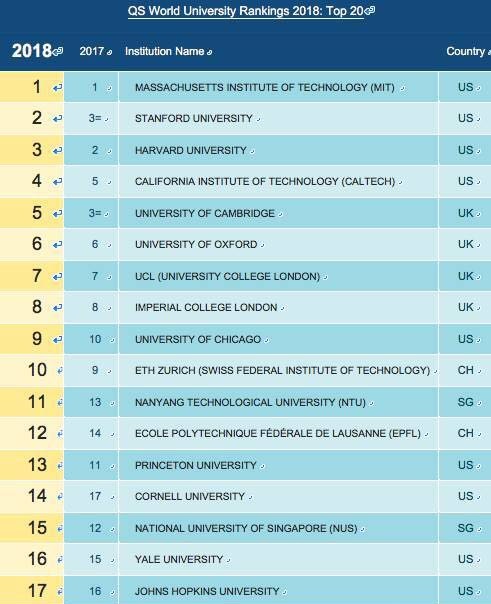The Nanyang Technological University (NTU) has overtaken the National University of Singapore (NUS) for the first time as Asia’s top university, achieving the highest position ever for a varsity here, in a global ranking published today.
It snared the 11th spot in the latest Quacquarelli Symonds (QS) global league table of top universities, making this “its best performance ever”, the university said.
The highest global ranking ever attained by a Singapore university was 12th, by NUS — a position it held for the past two years. This year, it dropped three places to 15th.
In 2014, NUS was ranked 22nd while NTU was in 39th place. NTU vaulted to 13th spot in 2015, and held the same rank last year.
Professor Bertil Andersson, president of NTU, said: “We know competition is extremely stiff in the upper echelon of the world’s best universities, and we cannot expect to continue to make big leaps. To climb up to the 11th spot (this year), just one place shy of the top 10, is remarkable progress.”
He added: “Even though NTU is now the highest-ranked Singapore university, I maintain what I have always said — Singaporeans should be very proud that (this) small nation … has two world-class universities.”
Some 950 campuses from more than 80 countries were rated in this year’s QS world university ranking, using performance indicators such as academic and employer reputation, student-to-faculty ratio and citations per faculty. They were also assessed in four areas: research, teaching, employability and internationalisation.
NTU has jumped 45 places since 2011 to quickly shoot up the world ranking. In the last three years, it has also topped the QS Top 50 under-50 ranking, which tables the world’s best young universities below 50 years old.
Prof Andersson, who was appointed the university’s president in 2011, said: “This 11th spot is the highest position a young university has attained in the world university rankings. I hope NTU’s success, which is built on hard work, determination and a mindset of change, will be an inspiration to other young universities in the world.”
He also listed three other “success factors”, which are “people, people, people”.
“NTU has attracted the best talents — top faculty; promising, upcoming investigators; and the brightest students,” he said.
Corporatised in 2006, NTU had the flexibility to chart its own strategic directions. Over the past decade, the autonomous university, located in Jurong West, has transformed “from a teaching university into a research-intensive one”, it said.
In the last five years alone, it has set up joint laboratories on its 200ha campus with international partners such as Rolls-Royce, BMW and American global security and aerospace firm Lockheed Martin.
This year, NTU made its biggest improvement in employer reputation, scaling 10 places to rank 38th internationally.
NUS, which is still among the top 2 per cent in the world ranking, was placed 11th for both academic and employer reputation globally.
Professor Tan Chorh Chuan, president of NUS, said: “While NUS is placed 15th this year … we are pleased to note that (it) continues to be very highly rated for academic as well as employer reputation.”
Article from Today


